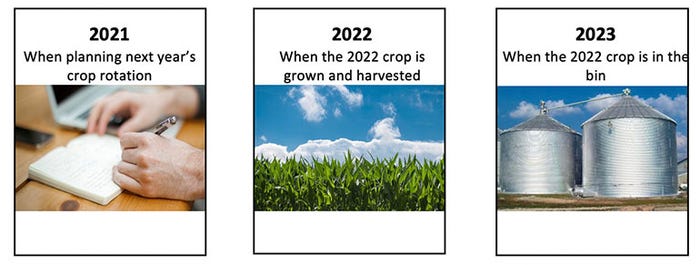April 26, 2021

Is it easier to…

No. This is not a trick question. How often do we find ourselves waiting until the crop gets harvested or in the bin before making a majority of our marketing decisions? Often our default response is to wait to see what we have and then look for opportunities to sell once it is in the bin.
An alternative to this approach is to proactively seek for opportunities to market that crop over multiple crop years. Let’s take the 2022 corn crop as an example. Growers can look for opportunities to sell during:

Essentially this gives us three growing cycles to look for selling opportunities. Did you happen to see that December 2022 corn futures are trading near $5.00 ($4.96 as of writing)? There has been a lot of years that we haven’t gone near that price. What if we start making sales for that timeframe while keeping upside flexibility in case prices go higher?
Notice that I mentioned making sales with upside flexibility. After all, no one truly knows how high the market will go. Keeping a disciplined philosophy of making sales at profitable levels while maintaining upside accomplishes two things:
allows you to lock in the profit in case the market declines and
the upside flexibility on those early sales give you the confidence to keep pulling the trigger on future sales as the market goes higher. Too often we fall into the “kick the dog” mentality trap where we feel like we sold too early. This can hold us back from making sales even if the market goes up another 20, 30, or 40 cents higher. We feel we missed out so we are going to try to hit a homerun to make up for that early sale. Planting that seed of upside flexibility on early sales can help to prevent some of this mental trap.
Another aspect to consider is market volatility. Currently the managed money funds are holding near record long positions in corn. While the prospects of dry weather in Brazil and uncertain planting weather in the United States can cause these speculators to continue to build upon this long position, a positive turn in the outlook in these crops could spark liquidation. Maybe we see a large decline followed by another rally later in the year. No one really knows. With proper positioning, by looking forward rather than backwards, it gives us three years to look at capturing market volatility.
With the time and resource demands placed on growers for managing the operational side of their farms, it can be difficult to see these openings. This is where a trusted advisor can be a valuable team member to point out these opportunities. Selling across multiple years can increase the chances of creating a higher weighted average price through the life of that crop.
John Maxwell, a respected thought leader on leadership, has said, “If you’re proactive, you focus on preparing. If you are reactive, you end up focusing on repairing.”
Let’s stay away from repair mode and instead, proactively look for opportunities across multiple crop years.
Contact Advance Trading at (800) 664-2321 or go to www.advance-trading.com.
Information provided may include opinions of the author and is subject to the following disclosures:
The risk of trading futures and options can be substantial. All information, publications, and material used and distributed by Advance Trading Inc. shall be construed as a solicitation. ATI does not maintain an independent research department as defined in CFTC Regulation 1.71. Information obtained from third-party sources is believed to be reliable, but its accuracy is not guaranteed by Advance Trading Inc. Past performance is not necessarily indicative of future results.
The opinions of the author are not necessarily those of Farm Futures or Farm Progress.
About the Author(s)
You May Also Like






